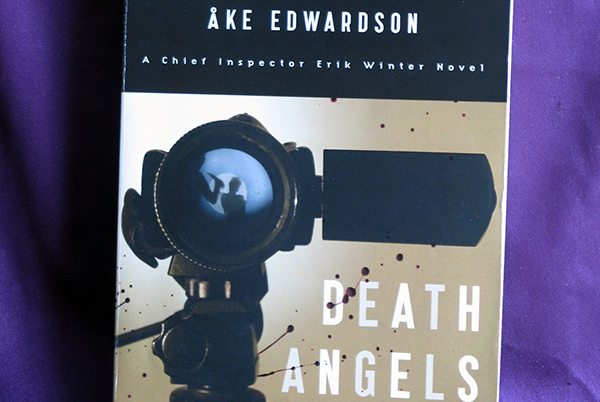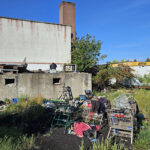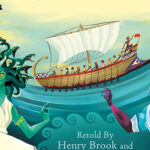Home »

Edwardson tries to see what is best in the world around us
Book Review
By Derryll White
Edwardson, Åke (2009). Death Angels.
Wild birds plow their way through the far reaches of space.
How many never reach their final destination.
But what difference does that make?
They die free. – Obelisk inscription
 Åke Edwardson wrote ‘Death Angels’ in 1997, the first of his Chief Inspector Erik Winter novels. By the time this book was translated into English a total of 10 works in the Erik Winter series had been published in Sweden. However, being the first, this is a good place to begin an exploration of this Swedish author.
Åke Edwardson wrote ‘Death Angels’ in 1997, the first of his Chief Inspector Erik Winter novels. By the time this book was translated into English a total of 10 works in the Erik Winter series had been published in Sweden. However, being the first, this is a good place to begin an exploration of this Swedish author.
Gothenberg, a southwestern Swedish city on the Gota River, is Edwardson’s (and Erik Winters’) home. A city of 500,000, it is Sweden’s most important industrial and commercial centre and port, and the centre of the huge Volvo empire. Gothenberg combines the darkness of colonial history with the glitter of the creative Scandinavian present. It is a great and exciting city to wander in, and Erik Winter does that a lot in this book.
The novel opens well. Erik Winter is the type of policeman who thinks, worries and philosophizes about man’s inhumanity to man. He is young but already worn down by the homicides he has seen, the sorrow he has been a part of. Edwardson is dark as a writer, and definitely Nordic. Daylight and weather are common reference points, as they are in Canada. Snow and ice and slippery roads. Most of all, though, the psychology of both people and events is ever-present in Edwardson’s writing. It’s not just a murder, it’s a murder movie, and the police personnel are human enough to get sick to their stomach at the simple thought of it.
Edwardson pays attention to detail, whether it is London or Gothenberg. He makes the reader feel the grit, the disgust for a society that is so stunted, so socially sated that snuff films are considered necessary to wake the participants up. No, the reader cannot really comprehend what would make such evil titillating, but Edwardson makes one stop to consider the fact that we share a world with such people.
This is a very good novel, hard in tone with many tender moments of humanity as well. In the end Edwardson tries to see what is best in the world around us, without denying the daunting evil that exists. He doesn’t ignore psychology or spirituality, so the book reads on many levels. What was very clear to me all the way through the novel is that Sweden is changing, the social fabric is being rent, mended and made new. Edwardson cares about this very much, providing a documentation of both fact and feeling. The book touched me and I look forward to reading more of Edwardson’s Inspector Erik Winter series.
********
GRIEF – Winter had a lot to tell Karin and Lasse Malmström but at first he just sat there, with his hands in theirs. Nothing in here has a life of its own any longer, he thought. The grief has taken over and the shadows have crawled out from their hiding places.
WEATHER – There are occasional moments in early February when spring whispers a message and then hastily retreats.
GOTHENBERG – …the young inspectors who’d gone straight from the National Police Academy to the beltway around the Gothenberg tinderbox. If something really horrific occurred they could go home for the day, but that wasn’t nearly good enough. They were in the middle of an inferno, both witnesses and participants as society devoured its own children. Nobody could be weak any more if they wanted to survive.
BRITISH SOCIETY – “The way it used to be, the rich were a trifle discrete. Now there’s nothing but open contempt. Those who have something to protect are arrogant and make it clear they don’t give a damn about anyone else.”
CELL PHONES – “The cell phone is a monstrous invention,” Winter said. “I’ve seen people standing on opposite street corners talking to each other.”
“It’s modern man’s way of keeping himself company.”
INVESTIGATIONS – Police work was all about waiting until the impossible becomes possible.
PORN – Walkers Court [London, England] was porn without silk sheets or the pink young models who show their pee hole in Hustler, Macdonald thought as he shook his head at a doorman who beckoned him into one of the theatres. It was more for sweaty junkies in rags – low budget sex for the masses, books, magazines and videos for those who came to see themselves as they might have been in another life.
THE NEW SEX – “Physical gratification isn’t what’s most appealing – maybe just the opposite, in fact. It’s more pleasurable without physical contact, because nobody is making any demands on you…. Some of the poor bastards who hang out in the screening rooms would be scared to death if they could get their paws on a living man or woman.”
 – Derryll White once wrote books but now chooses to read and write about them. When not reading he writes history for the web at www.basininstitute.org.
– Derryll White once wrote books but now chooses to read and write about them. When not reading he writes history for the web at www.basininstitute.org.







